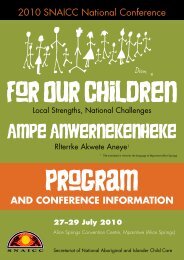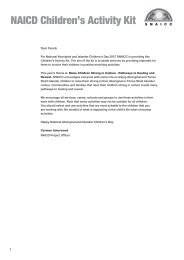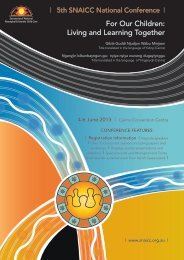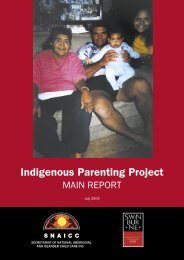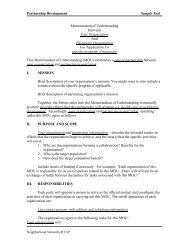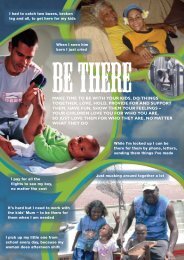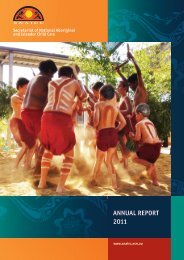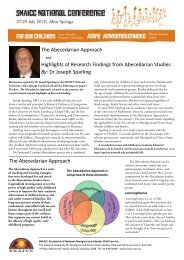View / Download Document - Secretariat of National Aboriginal and ...
View / Download Document - Secretariat of National Aboriginal and ...
View / Download Document - Secretariat of National Aboriginal and ...
Create successful ePaper yourself
Turn your PDF publications into a flip-book with our unique Google optimized e-Paper software.
A Queensl<strong>and</strong> perspective on child care workforce<br />
development issues:<br />
☻this discussion circle will present workforce development issues that have emerged<br />
through consultation in the child care skills formation strategy <strong>and</strong> provide<br />
opportunity for <strong>Aboriginal</strong> <strong>and</strong> Torres Strait Isl<strong>and</strong>er child care workers to discuss <strong>and</strong><br />
provide input.<br />
Robyn Burnett<br />
Tara Lee Franks<br />
Janice Rocca<br />
Roslyn Von Senden<br />
Barry Watson<br />
Department <strong>of</strong> Employment & Workplace Relations<br />
Health & Community Services Workforce Council<br />
Inclusion Support Agency – Brisbane<br />
Indigenous Pr<strong>of</strong>essional Support Unit – QCOSS<br />
Murri & Torres Strait Isl<strong>and</strong>er Network
Overview<br />
Introduction<br />
Workforce Council<br />
Child Care Skills Formation Strategy<br />
The structure <strong>of</strong> the project<br />
Issues Identified<br />
Working Parties<br />
Methodology<br />
Strategies & opportunities<br />
Discussion<br />
Moving forward…..maintaining momentum
Introduction<br />
Robyn Burnett<br />
Tara Lee Franks<br />
Janice Rocca<br />
Roslyn Von Senden<br />
Barry Watson<br />
Department <strong>of</strong> Employment & Workplace Relations<br />
Health & Community Services Workforce Council<br />
Inclusion Support Agency – Brisbane<br />
Indigenous Pr<strong>of</strong>essional Support Unit – QCOSS<br />
Murri & Torres Strait Isl<strong>and</strong>er Network
Health & Community Services Workforce Council<br />
Industry Reference Group<br />
Board <strong>of</strong> Management<br />
Skills Formation<br />
Strategies:<br />
Child Care<br />
Child Protection<br />
Aged Care<br />
Health<br />
Skills Development<br />
projects:<br />
Pr<strong>of</strong>essional<br />
Support<br />
Coordinator<br />
Queensl<strong>and</strong> (PSCQ)<br />
Integrated Skills<br />
Development Strategy<br />
Disability Sector<br />
Training Fund<br />
Skills Alliance:<br />
Advice to<br />
government on<br />
sector learning<br />
needs<br />
Strengthening<br />
NGO projects:<br />
Minister’s Awards<br />
for Excellence in<br />
Workforce<br />
Development<br />
Communities/VET<br />
Partnership project<br />
(RPL)<br />
HACC Workforce<br />
Skills Development<br />
strategy
Child Care Skills Formation Strategy<br />
A “supported change process” project funded by<br />
Department <strong>of</strong> Communities <strong>and</strong><br />
Department <strong>of</strong> Education Training & the Arts<br />
Enables industry to address issues around “skills shortages” – supply <strong>of</strong><br />
labour.<br />
Industry <strong>and</strong> state/ federal government stakeholders collaborate to analyse<br />
skill shortages<br />
Align skills formation to workforce development <strong>and</strong> business strategy<br />
VET providers to support industry business - training is not necessarily the<br />
solution<br />
- Wise investment <strong>of</strong> public training dollars.<br />
Build partnerships with others to address issues
The Structure <strong>of</strong> the strategy<br />
CHILD CARE WORKFORCE PLANNING NETWORK<br />
Industry<br />
Reference<br />
Group<br />
Indigenous<br />
Issues<br />
Recruitment<br />
Retention<br />
& Conditions<br />
Systemic<br />
Controls<br />
& Barriers<br />
Pr<strong>of</strong>ile
Methodology<br />
Indigenous representatives within all areas <strong>of</strong> the structure<br />
Consultation with the sector<br />
Sharing perspectives within all areas <strong>of</strong> structure within the project<br />
Identification <strong>of</strong> specific issues<br />
Forming steering committee<br />
Consultation with Indigenous Remote Area Students ( Tropical North<br />
Queensl<strong>and</strong> TAFE)<br />
<strong>Aboriginal</strong> & Torres Strait Isl<strong>and</strong>er Workforce Development Forum<br />
Child Care Skills Formation Strategy Strategic Planning day<br />
SNAICC Conference<br />
Feedback information to the sector<br />
Opportunity for Strategic Planning Day in Cairns/Far North Queensl<strong>and</strong>
Issues Identified<br />
The Children’s Services Workforce Planning Network (CSWPN) identified the<br />
key workforce issues currently impacting on children’s services in Queensl<strong>and</strong>.<br />
This group then classified the issues into six clusters.<br />
Collective identity<br />
External Recognition <strong>of</strong> the Pr<strong>of</strong>ession<br />
Individual pr<strong>of</strong>essional identity<br />
Workforce Conditions<br />
Recruitment <strong>and</strong> Retention<br />
Systemic Controls <strong>and</strong> Barriers
The Working Parties<br />
• Pr<strong>of</strong>ile (Collective identity, External Recognition <strong>of</strong><br />
the Pr<strong>of</strong>ession, Individual pr<strong>of</strong>essional identity)<br />
• Recruitment, Retention <strong>and</strong> Conditions<br />
• Systemic Controls <strong>and</strong> Barriers<br />
• Indigenous Issues
The Working Parties<br />
Pr<strong>of</strong>ile<br />
(Collective identity, External Recognition <strong>of</strong> the Pr<strong>of</strong>ession, Individual pr<strong>of</strong>essional<br />
identity)<br />
Previously identified issues:<br />
Poor public perception <strong>of</strong> sector – second rate career<br />
Lack <strong>of</strong> community recognition <strong>of</strong> high level <strong>of</strong> training<br />
Low value <strong>of</strong> roles & expectations within community <strong>and</strong> employers<br />
Poor pr<strong>of</strong>essionalism in sector<br />
Issues from <strong>Aboriginal</strong> & Torres Strait Isl<strong>and</strong>er Forum:<br />
Lack <strong>of</strong> recognition <strong>of</strong> strengths <strong>of</strong> Indigenous workers (which varies if all<br />
Indigenous staff caring for Indigenous chn or for Indigenous staff working in<br />
mainstream<br />
Lack <strong>of</strong> cultural underst<strong>and</strong>ing by mainstream service providers <strong>and</strong> or staff<br />
Indigenous staff expected to wear many hats during workings hours <strong>and</strong><br />
after
The Working Parties<br />
Systemic Controls & Barriers<br />
Previously identified issues:<br />
Many govt/dept priorities <strong>and</strong> expected outcomes<br />
Complexity <strong>of</strong> Legislative requirements & accreditation <strong>and</strong> other st<strong>and</strong>ards<br />
e.g. Current child:staff ratio difficult to optimise children’s development<br />
A range <strong>of</strong> funding sources, types, even though similar outcomes for<br />
children are expected<br />
Issues from <strong>Aboriginal</strong> & Torres Strait Isl<strong>and</strong>er Forum:<br />
Working in different systems within the community, QA, Licensees, different<br />
regulations <strong>and</strong> controls<br />
Lack <strong>of</strong> cultural underst<strong>and</strong>ing from government departments & <strong>of</strong>ficers – this<br />
impacts on consultation processes relating to regulations <strong>and</strong> licensing Advocacy for<br />
Indigenous validators (QA)<br />
Needs for more govt strategies – linking to Aust govt policy to improve outcomes<br />
for Indigenous child care services
The Working Parties<br />
Recruitment, Retention & Conditions<br />
Previously identified issues:<br />
Workers move on to the other employment for better wages & conditions<br />
Concern about graduates ability to fit into <strong>and</strong> manage in the workforce<br />
Inconsistency <strong>of</strong> qualification remuneration across sectors – hours, pay,<br />
holidays, & conditions<br />
Attracting men into child care<br />
Issues from <strong>Aboriginal</strong> & Torres Strait Isl<strong>and</strong>er Workforce development Forum:<br />
accommodation – places for workers to live<br />
blue card impacts greatly, cost <strong>of</strong> blue cards <strong>and</strong> a long process police records so they<br />
don’t get a blue card – through a lack <strong>of</strong> underst<strong>and</strong>ing <strong>of</strong> the culture <strong>of</strong> the community<br />
for example domestic violence<br />
mainstream people coming from outside the community to work – people in the<br />
community aren’t interested in the work – because the study is putting people <strong>of</strong>f.<br />
Strategies to attract Indigenous people in child care services.
The Working Parties<br />
Indigenous Issues<br />
Training <strong>and</strong> Qualifications<br />
Wages Backfilling<br />
Local Mentoring (Choose someone who lives in the community <strong>and</strong><br />
mentor them to become qualified)<br />
Recognition <strong>of</strong> Prior Learning (RPL)<br />
Incentives for Study<br />
Cultural Underst<strong>and</strong>ing:<br />
Services not truly reflecting family <strong>and</strong> children’s needs making<br />
assumptions<br />
Staff sharing cultural values in order to identify attitudes <strong>and</strong> bias’s –<br />
reflecting on themselves<br />
Services that provide culturally respected programs are in fluxed with<br />
indigenous children - community
Strategies & Opportunities<br />
Department <strong>of</strong> Employment & Workplace Relations<br />
- Indigenous Employment Policy<br />
Continuing research<br />
“Big Picture Series”- Access Grid Technology<br />
Community Services Training Package Review<br />
Facilitating social partnerships<br />
Griffith University/ Bremer TAFE - Career pathways<br />
Circles <strong>of</strong> Change
Department <strong>of</strong> Employment & Workplace Relations<br />
The Main Objective <strong>of</strong> the IEP (Indigenous Employment Policy)<br />
To improve the employment prospects <strong>of</strong> Indigenous Australians by:<br />
increasing the level <strong>of</strong> Indigenous Australians’ participation in the private<br />
sector<br />
improving outcomes for Indigenous job seekers through Job Network<br />
supporting the development <strong>and</strong> expansion <strong>of</strong> Indigenous small business.<br />
IEP comprises a number <strong>of</strong> initiatives such as:<br />
Wage Assistance (W/A)<br />
Corporate Leaders for Indigenous Employment (CLIEP)<br />
<strong>National</strong> Indigenous Cadetship Program (NICP)<br />
Indigenous Small Business Fund (ISBF)<br />
Structured Training <strong>and</strong> Employment Project (STEP)
Discussion<br />
Any surprises? Or anything new?<br />
Anything significant for you in your workplace?<br />
Do you know <strong>of</strong> any similar projects within your states<br />
<strong>and</strong> territories?<br />
Any further issues you would like to highlight that are<br />
relevant to Indigenous workforce development?<br />
Any ideas/strategies/solutions to addressing these workforce<br />
development issues?
Moving forward…….maintaining momentum<br />
What would you like to happen with the information you have shared<br />
today?<br />
Aspirations……………….<br />
Building collaborative partnerships<br />
Pr<strong>of</strong>essional Support Coordinator Queensl<strong>and</strong><br />
TAFE Queensl<strong>and</strong><br />
Department <strong>of</strong> Communities<br />
Department <strong>of</strong> Employment & Workplace Relations<br />
Indigenous Pr<strong>of</strong>essional Support Unit<br />
Inclusion Support Agencies
Contacts for Child Care Skills Formation Strategy<br />
Robyn Burnett<br />
Robyn.Burnett@dewr.gov.au<br />
Tara Lee Franks<br />
tfranks@workforce.org.au<br />
Janice Rocca<br />
Janice.Rocca@lccq.org.au<br />
Roslyn Von Senden<br />
Roslynv@qcoss.org.au<br />
Barry Watson<br />
mtsinet@tpg.com.au
Child Care Skills Formation Strategy<br />
Individual Pr<strong>of</strong>essional Identity<br />
External Recognition <strong>of</strong> the Pr<strong>of</strong>ession<br />
A series <strong>of</strong> focus questions were distributed<br />
to the child care sector throughout 13 regions<br />
to collect information about pr<strong>of</strong>essional<br />
identity.<br />
Circles for change –<br />
taking an opportunity<br />
to participate in learning<br />
circles around specific<br />
topics.<br />
Facilitating social partnerships<br />
Career pathways<br />
‣Mainstream & Indigenous<br />
‣2007 Child care event<br />
• Continual research<br />
• Pr<strong>of</strong>essional membership i.e. ARACY<br />
• “Big Picture Series”<br />
• Grid Access Facilities<br />
• Statewide summit/forum<br />
• CSTP Review<br />
• Pr<strong>of</strong>ile <strong>of</strong> child care/worker<br />
Recruitment, Retention & Conditions<br />
Comparing wages/ awards/ conditions<br />
nationally<br />
Acknowledgement <strong>of</strong> remote/rural issues<br />
Focus questions/survey<br />
Themes identified:<br />
Income, family/income, lifestyle, previous<br />
experience, growth & development<br />
Systemic Controls & Barriers<br />
New members for the working party to gain a<br />
new perspective around the systemic issues.<br />
i.e. DEWR, Education Qld<br />
Identifying legislative requirements <strong>and</strong><br />
st<strong>and</strong>ards



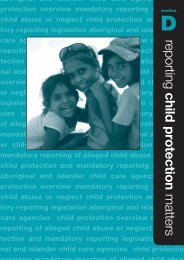
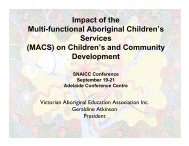
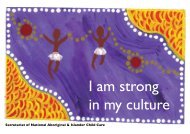
![Kukumbat gudwan daga - really cooking good food. [PDF 716 KB]](https://img.yumpu.com/47617674/1/190x134/kukumbat-gudwan-daga-really-cooking-good-food-pdf-716-kb.jpg?quality=85)
